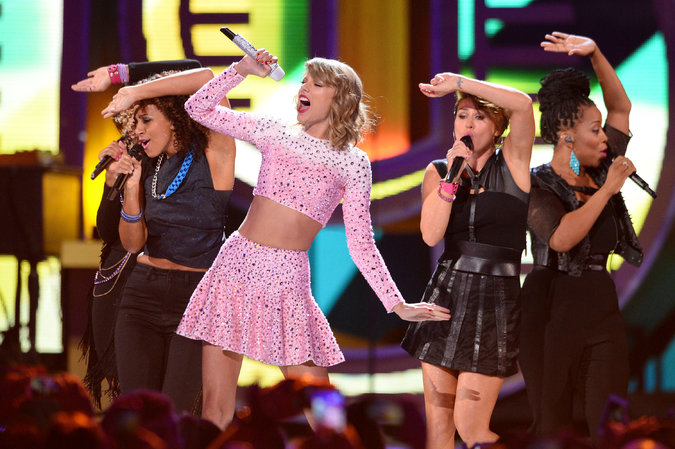Spotify is the future. Spotify is the enemy. Spotify doesn’t pay enough. Spotify is music’s best bet for revenue growth.

Since it arrived in the United States from Sweden in 2011, Spotify has been cast as both hero and villain in the music industry’s continuing debate over streaming music. It has been hailed as a potential savior through a two-tiered freemium model that would gradually lure listeners away from piracy. Yet Spotify’s royalty rates have also terrified many artists already worried that each new step in music’s digital evolution further devalues their work.
This debate has taken center stage in the industry thanks to the decision by Taylor Swift to remove her entire catalog from Spotify. Calling streaming outlets like it a grand experiment, Ms. Swift told Yahoo in an interview last week: I’m not willing to contribute my life’s work to an experiment that I don’t feel fairly compensates the writers, producers, artists and creators of this music.
Daniel Ek, Spotify’s chief executive, said it was a myth that the streaming service’s royalties are too low to support artists. Credit Spencer Platt/Getty Images
Ms. Swift sold nearly 1.3 million copies of her latest album, 1989, in its first week on sale, giving a talking point to critics who believe that Spotify, for all its hype, is not necessary for success.
Is Streaming Good for Musicians?NOV. 6, 2014
In response, Daniel Ek, Spotify’s chief executive, posted a statement on Spotify’s blog on Tuesday defending the service’s business model and updating some of its crucial statistics. Spotify has now paid $2 billion in royalties, he said, and it continues to grow quickly, with 50 million users around the world, 12.5 million of whom pay for subscriptions.
All the talk swirling around lately about how Spotify is making money on the backs of artists upsets me big time, Mr. Ek wrote. Our whole reason for existence is to help fans find music and help artists connect with fans through a platform that protects them from piracy and pays them for their amazing work.
Spotify has long portrayed itself as a preferable alternative to piracy. Users of its free version can listen to any song they like, and in return hear advertising. Once listeners are hooked, Spotify’s theory goes, they will be enticed to pay $10 a month for its premium version, which eliminates the ads.
Part of Spotify’s pitch to the music industry has been that its royalties — as low as 0.6 cents per stream, according to the company — will accrue as the service grows and as people listen more. Yet the company has been criticized by artists who believe that its rates are simply too low, and who also argue that the ubiquity of streaming music has contributed to a rapid decline in sales.
In the first half of 2014, sales of CDs and downloads were down 14.6 percent compared with the same period last year, according to the Recording Industry Association of America. At the same time, streaming services like Spotify, Pandora and YouTube grew quickly; for the first half of 2014, they were up nearly 28 percent in the United States.
In an article posted last week on the website of Wired magazine, the singer and songwriter Aloe Blacc — best known as the vocalist on Avicii’s 2013 hit Wake Me Up — said he supported Ms. Swift’s decision to remove her music from Spotify and criticized the level of payouts to songwriters from streaming music services. Singling out Pandora, the leading Internet radio outlet, he said that Wake Me Up had been played 168 million times in the United States on that service, yet yielded only $12,359 in publishing royalties, of which he kept less than $4,000.
Those numbers were quickly subjected to scrutiny online from other musicians and music analysts. Among other things, they noted that Aloe Blacc mentioned only his songwriting royalties, not the separate and most likely higher royalties he would make as a performing artist.
In his post on Tuesday, Mr. Ek said that payouts for a top artist like Taylor Swift are on track to exceed $6 million a year.
Yet one of the more hotly debated points about Spotify is not just about how much money it pays but also about how it handles the music it has. In a radio interview on Friday, Scott Borchetta, chief of Ms. Swift’s record label, Big Machine, said that the label wanted to restrict access to her music to Spotify’s paid tier, but Spotify refused.
We never wanted to embarrass a fan, Mr. Borchetta said on the show, Sixx Sense, one of whose hosts is Nikki Sixx of the band Mötley Crüe. If this fan went and purchased the record, CD, iTunes, whatever, and then their friends go: ‘Why did you pay for it? It’s free on Spotify,’ we’re being completely disrespectful to that superfan who wants to invest, who believes in their favorite artist.
Although Big Machine has not made 1989 available on streaming services, it has kept Ms. Swift’s back catalog on other services like Beats Music and Rhapsody that do not have free versions, and Rdio, whose free version is based on custom radio stations that do not allow full on-demand listening.
Correction: November 11, 2014
An earlier version of this article misquoted Scott Borchetta, the head of the label Big Machine. Mr. Borchetta said, If this fan went and purchased the record, CD, iTunes, whatever, and then their friends go, ‘Why did you pay for it? It’s free on Spotify,’ we’re being completely disrespectful to that superfan who wants to invest, who believes in their favorite artist, not we’re being completely respectful.





